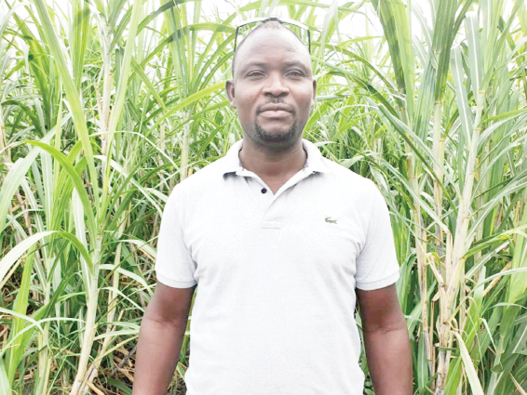Dangote refinery empowers Adamawa farmers on sugarcane cultivation
The Dangote Sugar Refinery (DSR) in Numan, Adamawa State, had empowered over 781 farmers in sugarcane cultivation, in an effort to reduce the rate of unemployment in the host community of the company. The farmers under the auspices of the Out-Growers Farmers Association were engaged to cultivate sugarcane in the company’s farmlands, while the company […]

Mr Adamu Magani, one of the out-growers farmers of Dangote Sugar Refinery, Numan, Adamawa State
The Dangote Sugar Refinery (DSR) in Numan, Adamawa State, had empowered over 781 farmers in sugarcane cultivation, in an effort to reduce the rate of unemployment in the host community of the company.
The farmers under the auspices of the Out-Growers Farmers Association were engaged to cultivate sugarcane in the company’s farmlands, while the company provided them with seedlings, fertilizers, insecticide and other farming implements required.
Daily Trust on Sunday learnt that the Out-Growers’ programme of the DSR, Numan, had provided both direct and indirect labour to thousands of youths in Numan, Demsa, Lamurde, Guyuk and Shelleng local government areas of the state.
According to the farmers, the company buys the sugarcane from them after harvest, by deducting the money for the farm inputs earlier provided for them during plantation.
Israel-Palestine war: UN Security Council under scrutiny
Desperate Peseiro forcing Uzoho to the river
Some of the farmers who spoke to our correspondent said since the adoption of the programme, they have abandoned cotton and rice farming to fully engage in sugarcane cultivation, which they described as “more profitable”.
According to a sugarcane farmer, Mr Adamu Magani, the Dangote sugar refinery introduced the out-growers programme about 10 years ago, as a poverty alleviation scheme to help the host communities.
“The company allocated lands to the farmers and then gave all the necessary inputs to support us. On the other hand, the farmer will look after the farm until cultivation, which usually takes 18 months.
After harvest, the company would buy the sugarcane from us after deducting all the money for the farm implements they provided during the plantation,” he said.
Mr Magani added that the company buys the sugarcane per ton, which cost over N17,000 last year.
“On average, it depends on how you maintain your farm, but a hectare can produce about 170 tons of sugarcane after harvest. Last year, I got over N2 million as net profit, that is after all the deductions,” he said.
Magani added that before introducing the scheme, “as subsistence farmers, we use to plant rice, guinea corn and cotton and most of the time, we find it hard to even feed our families but now, I have ventured into several investments courtesy of the sugarcane farming and I can take care of my family of 10 effortlessly.”
Meanwhile, the Dangote Sugar Refinery (DSR) said it employed no fewer than 7,000 workers yearly in its Backward Integration Project (BIP) in Numan, Adamawa State.
Speaking during a media tour of the company in Numan, Group General Manager Operations, Bello Abdullahi Dan-Musa, said the workers were employed at the peak of the season.
Dan-Musa said most of the employees are often engaged on a temporary basis during the cane production season.
He said only recently, the company paid over N500 million to the out-growers for the sugarcane they produced under the Out-Grower’s scheme.
According to him, the company is being upgraded to 6,000 tons of cane per day by the end of 2023, 9,800 by 2024 and subsequently to 15,000, from the current capacity of 4,800.
On his part, Chief Executive Officer/Managing Director, Chinnaya Sylvain Judex, said the expansion drive has reached a significant mileage.
He said the company has acquired state of the art machines to support its production process, adding that its facilities are environmentally friendly.
Mr Judex added that its Backward Integration goal is to become a global force in sugar production, by producing 1.5M MT/PA of refined sugar from locally grown sugar cane for the domestic and export markets.
He said the company operates an independent power system, and that excess energy will be redirected to the national grid.
According to him, the power from Dangote Sugar Refinery, Numan, when redirected to the National Grid has the potential to contribute immensely to the rapid development of the economy of the entire Northeast sub-region.
Mr Judex added that the energy will bring about accelerated development and industrialisation in the region.
Our correspondent reports that the journalists were at the refinery following a two-day environmental reporting organised by the Dangote Group, in conjunction with Climate Africa Media Initiative Centre (CAMIC).
During the two-day training, 50 selected journalists from six Northeast states of Adamawa, Bauchi, Borno, Gombe, Taraba and Yobe were urged to imbibe and inculcate the habit of reporting climate change and environment for sustainability.
With the theme: ‘Reporting the Environment for Sustainability,’ the workshop was aimed at equipping the journalists with rudiments of environmental journalism and reporting in their daily reportage.
